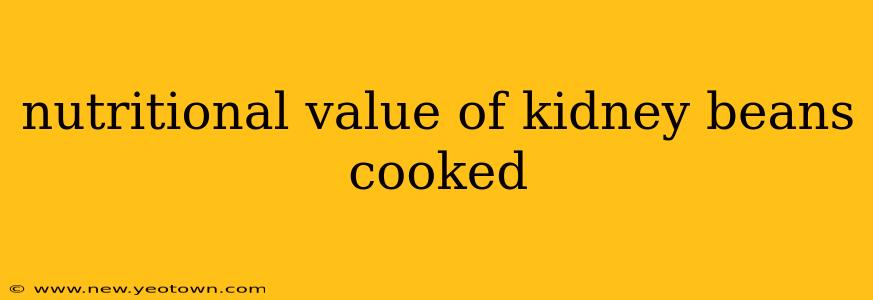Kidney beans, those humble crimson jewels of the legume family, are far more than just a delicious addition to chili or a hearty side dish. They're nutritional powerhouses, packed with essential vitamins, minerals, and fiber that contribute significantly to a healthy and balanced diet. But what exactly are the nutritional benefits when they're cooked? Let's dive in and explore the bounty within.
My name is Anya Petrova, and I've spent years researching the nutritional benefits of various foods, particularly legumes. I'm passionate about helping people understand how simple dietary changes can lead to significant improvements in their overall well-being.
What are the main nutritional benefits of cooked kidney beans?
Cooked kidney beans boast an impressive nutritional profile. They're an excellent source of protein, making them a fantastic option for vegetarians and vegans looking to boost their protein intake. Beyond protein, they're rich in dietary fiber, which aids digestion and promotes gut health. This fiber also contributes to feelings of fullness, making them a great choice for weight management. Finally, they contain various essential vitamins and minerals, including iron, folate, and potassium, all vital for numerous bodily functions.
Are cooked kidney beans good for weight loss?
Absolutely! The high fiber content in cooked kidney beans is key here. Fiber absorbs water, expanding in your stomach and creating a feeling of fullness. This helps you eat less overall, contributing to weight loss or maintenance. Furthermore, the protein in kidney beans helps to regulate blood sugar levels, preventing those energy crashes that often lead to overeating. They're a satisfying and nutritious addition to any weight-loss plan.
How many calories are in cooked kidney beans?
The calorie count in cooked kidney beans varies slightly depending on preparation methods, but a one-cup serving generally contains around 220 calories. Considering the abundance of nutrients and the sustained energy they provide, this is a surprisingly low calorie count for such a filling and nutritious food.
What are the benefits of eating kidney beans daily?
Incorporating cooked kidney beans into your daily diet offers numerous benefits beyond weight management. The high fiber content promotes regular bowel movements, reducing the risk of constipation. The iron content supports healthy blood production, and the folate is crucial for cell growth and development, especially important during pregnancy. The potassium content supports heart health by helping to regulate blood pressure. Regular consumption contributes to overall improved digestive health, increased energy levels, and a reduced risk of chronic diseases.
Are there any downsides to eating kidney beans?
While incredibly beneficial, it's crucial to properly cook kidney beans. Raw kidney beans contain a toxin called phytohaemagglutinin, which can cause nausea and vomiting. Thorough cooking, however, deactivates this toxin, rendering the beans safe for consumption. Also, some individuals might experience gas or bloating, especially when first incorporating them into their diet. Starting with small portions and gradually increasing intake can help mitigate these side effects.
Conclusion: Embrace the Bean Power!
Cooked kidney beans are a nutritional powerhouse, offering a multitude of health benefits. From promoting weight loss and digestive health to supporting heart health and providing essential vitamins and minerals, they deserve a prominent place in a balanced diet. So, next time you're planning a meal, remember the incredible nutritional value of these humble, yet mighty, beans. Embrace the bean power!

